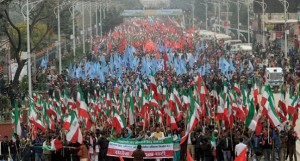 |
 |
 |
|
Bed of thorns
Sadbhawana Party President Rajendra Mahato was full of rage against Congress and UML leaders during his interview with Republica last week. He pointed to “KP Oli tendency” in NC and UML as the major hurdle to progressive state restructuring and accused them of misrepresenting the demand for separate Madhesh province as the demand for a separate country. He threatened civil war or opposition protests ending as a movement for a separate country in Madhesh if inclusive federalism was not granted. Mahato is a controversial figure. He is regarded as a close confidante of Delhi. He drew flak in December 2013 by saying that electoral defeat of Madheshi parties was tantamount to India’s defeat in Tarai plains. He courted controversy by threatening to “chop off” fingers of those who spoke against Madheshis. His extreme stand on federalism—he is not going to agree to more than two provinces in Madhesh— is equally unpalatable. Surely, Mahato does not represent all Madheshis but it would be a mistake to rebuff him. One of his statements was alarming. When gently urged to drop radical federalism demand (I make this request to every radical federalist during informal conversation) and instead to focus on institutionalizing proportionate representation, inclusion and social justice, his reply sent me reeling. “If we cannot have separate provinces in Tarai,” he said rather confidently, “Tarai will slip out of our hands. We will be irrelevant and the southern plains will go into the hands of extremists like CK Raut.” This prospect is not farfetched, he cautioned. Let us hope Mahato’s prophesy fails. But the ground, as this scribe had predicted earlier this year, seems to be shifting in favor of radical politics in Tarai. Risks and challenges to constitution making have multiplied in this two-month moratorium since Constituent Assembly missed its deadline to promulgate draft constitution by January 22. Madhesh is at the center stage again, vulnerable and reactive. Take government decision to shift Land Revenue Office and Land Survey Office to Simara from Kalaiya and the protests that ensued last month. Kalaiya reacted in anger. When the government backed down, Simara erupted in rage. The dissent had nearly taken communal colors and fomented Pahade-Madheshi conflict—thanks to timely intervention, nothing untoward happened. But this is a prologue to possible anarchy in the plains, if and when provinces are delineated, on whatever basis. Add to it the government absence and one gets an even more alarming picture. Most Madheshi youths leave for Gulf countries and Malaysia. Those who stay back are filled with resentment. Poverty and deprivation have made them violent. NC-UML government’s dismal performance has frustrated them. There is enough room for the radical federalists like Mahato and Upendra Yadav—who feel being confined to regional politics since their electoral defeat—to manipulate the angry masses. Their recent posturing also indicates that they could defect from thirty-party alliance and join the bandwagon of CK Raut and Jaya Prasad Gupta, if the alliance does not back their agenda. Political alliance is often a marriage of convenience. While sense of neglect runs deep in Tarai, constitution debate in Kathmandu is being lost to new competing claims. Monarchists are trying to create space for former king by throwing a ‘secret deal’ card. They hold that late Girija Prasad Koirala and Madhav Kumar Nepal had a secret understanding with King Gyanendra to retain monarchy in some form in the post-2006 set up and that India had foiled this plan. They contend that GPK did not intend to abolish monarchy because he was in favor of ‘baby- king.’ Madhav Nepal has denied any such understanding. But if there had been even slight hint to retain monarchy and if state actors of the time testify to it, it will boost restoration argument, adding another dimension to constitution process. Far-fetched prospect for the moment, but it can further complicate the situation. Maoists and Madheshis have started to invoke late Koirala. They are trying to make it appear that GPK’s signing of CPA in 2006 was endorsement of Maoist vision of state restructuring. Madheshis claim he had consented to “autonomous Madhesh province” demand. In fact, GPK had taken this drastic step to avert the worst. He had no idea what federalism meant even after he had signed the deal with agitating Madheshis. April is the cruelest month, says English poet TS Eliot. April in Nepal often marks beginning of protests and mayhem, hate and resentment. Madheshi leaders have warned of making it a cruel month this year. If it happens, it will open the door for Far-west to spring to action against division, far-East to rise for Koch and Limbuwan, Bahun-Chhetri to stand against undivided Nepal. By May 29 (the second deadline parties have set for statute), we will be back to May 2012 when such claims had given an excuse to the leaders to put off the inevitable. With the increasing number of stakeholders, interests, claims and counterclaims have multiplied. Collateral damage, however, can be minimized if we act responsibly. First, the government needs to increase its presence in Tarai. Ruling parties seem clueless about what Tarai thinks of them. If people of this region are still with them, as they were during the CA II polls, NC and UML can go ahead with voting process. But people’s mood swings. Perhaps the situation has altered. Perhaps anger and resentment against NC-UML coalition has reached a peak there. Some of this resentment can be calmed if it starts delivering on governance. Second, we need to tone down hate. Speak of Madhesh and Madheshis with respect. Some Tarai leaders are convinced that federalism is panacea to all evils. Madhesh needs to be told that lack of development in Tarai does not owe to lack of federalism but to the tendency of its leaders not to heed people. Great many Madheshi leaders bagged lucrative ministerial berths in the past. Madheshi ministers head development ministries even today. Third, media debate on federalism has created fault lines. We have made it appear like all Pahades are oppressors and all Madheshis the oppressed. These polarized narratives need to be balanced. We need to begin by acknowledging that injustice has been done to Madheshis but it has not spared poor hill Brahmin-Chhetris either. Madheshis have been deprived of state facilities. They would be required a visa permit to come to Kathmandu until 1950. Madheshis fare much worse in literacy, income and education. Human Development Indicator shows much worse condition in Tarai compared to Hills. Madheshis and Janajati representation in state bodies is woefully low. But there are also the Brahmins and Chhetris in the hills who struggle for education, health and livelihood. Such acknowledgement is missing in the faulty discourse of Hill-Madhesh discrimination. If we had started with honest acknowledgement of the sufferings of each other and worked with genuine conviction to change, federalism debate would not have taken a nasty turn. If we had pretended not to realize that lack of functioning decentralization, and accountable and truly socialist government could help reduce economic inequality, if we had worked to economically empower the less advantaged, things would have been different. Uncertainly and prospect of chaos is staring us. But it is in our capacity to push for the last two conditions mentioned above. Politicians won’t do it. We the writers, journalists and the intellectuals should. |

